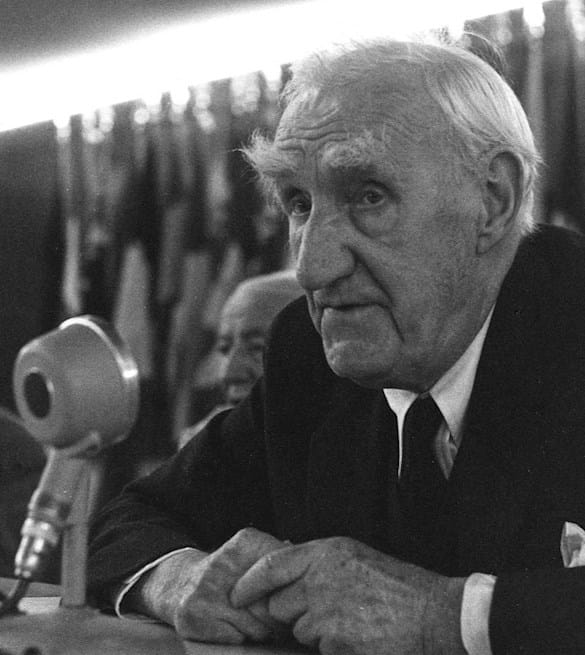THE citation for the 1949 Nobel Peace Prize read: “for his lifelong effort to conquer hunger and want, thereby helping to remove a major cause of military conflict and war”.
There in essence was the driving force behind John Boyd Orr’s long, varied and distinguished life.
He was born in Ayrshire into a religious and highly literate family, and it was perhaps inevitable that he should be destined for a career in teaching after studying theology. However, his studies at Glasgow University also opened up new avenues for him. He became interested in the theories of Darwin, and this led to a fascination with zoology.
When he graduated with his MA in 1902, he was assigned to a teaching position in the Glasgow slums to fulfil the obligations required by his scholarship. He lasted only a few days before resigning and going back home to Ayrshire where he was reassigned to a school in Saltcoats. There he completed his teaching but left as soon as he could, saying: "though I liked the children, I hated teaching them”.
Boyd Orr returned to university to study biology and medicine, and he graduated with a BSc in 1910 and MB ChB two years later. He only practised for one month before returning to university to undertake nutritional research. His MD thesis in 1914 was awarded the Bellahouston Gold Medal for the most distinguished thesis of the year.
On the recommendation of his supervisor, he was asked to be the first director of a new research institute in Aberdeen, which would later become the world renowned Rowett Institute. At the time of his appointment, it did not exist, but he would spend the next twenty-five years raising both funds and the profile of nutritional research to make it a reality.
The initial work to build the institute was, however, interrupted by the outbreak of war. Boyd Orr enlisted in the RAMC and saw active service on the Western Front where he was awarded both the Military Cross and the Distinguished Service Order. Later he would never wear the medals saying that the truly brave men had all died.
In the interwar years, he travelled widely and published extensively, emerging as one of the country’s leading experts in nutrition. He first came to national attention in 1936 with the publication of Food, Health and Income, a report of a dietary survey by income group, which revealed that the cost of a diet meeting basic nutritional needs was beyond the means of half the British population.
This led to similar studies being conducted in nineteen other countries and prompted the creation of a Commission of the League of Nations, which tried to formulate a global food policy. It became the forerunner of the United Nations Food and Agriculture Organization (FAO). Boyd Orr would become the Director General of the FAO from 1945-48. These were important years because the predicted European post-war famine was averted in part by policies put forward by the organisation.
Boyd Orr was no stranger to the challenges of developing and implementing food policies, many of which are still with us today. He spent his later career trying to persuade governments and presidents, organisations and companies to rethink the way they did things. However, he would often bemoan the fact that while he could persuade farmers of the importance of the nutrition of their animals, he could not stir their interest “in the food of their ain bairns, far less in the bairns of ither folks”.
His was a life filled with honours and awards, from Gold medals at University to military decorations to honorary degrees and more. He was elected Rector of Glasgow University and subsequently became its Chancellor. He was briefly a British Member of Parliament, and in 1935 he was knighted for his services to agriculture. In 1949, after he was awarded the Nobel Prize, Prime Minister Clement Attlee ennobled him as Baron Boyd Orr of Brechin Mearns.
One reading of Boyd Orr’s long career is of a series of false starts and perhaps even failures. But he was no dilettante. He combined a powerful intellect with an admirable work ethic to achieve a mastery in everything he tried. That he chose to move from a career in teaching to medical practice, to research, to politics and then to governance and policy making was not evidence of mere restlessness but of a constant desire to do meaningful work.
Boyd Orr was at heart a man with an ambitious vision for the world, and he firmly believed that real peace and prosperity would only ever be achieved when no one was hungry.
Sources
- The Nobel Peace Prize 1949, www.nobelprize.org
- New York Times, Obituary. June 26, 1971
- British Medical Journal, Obituary. 3 July 1971
- Boyd Orr Centre for Population and Ecosystem Health, www.gla.ac.uk
This page was correct at the time of publication. Any guidance is intended as general guidance for members only. If you are a member and need specific advice relating to your own circumstances, please contact one of our advisers.
Read more from this issue of Insight Secondary

Save this article
Save this article to a list of favourite articles which members can access in their account.
Save to library

